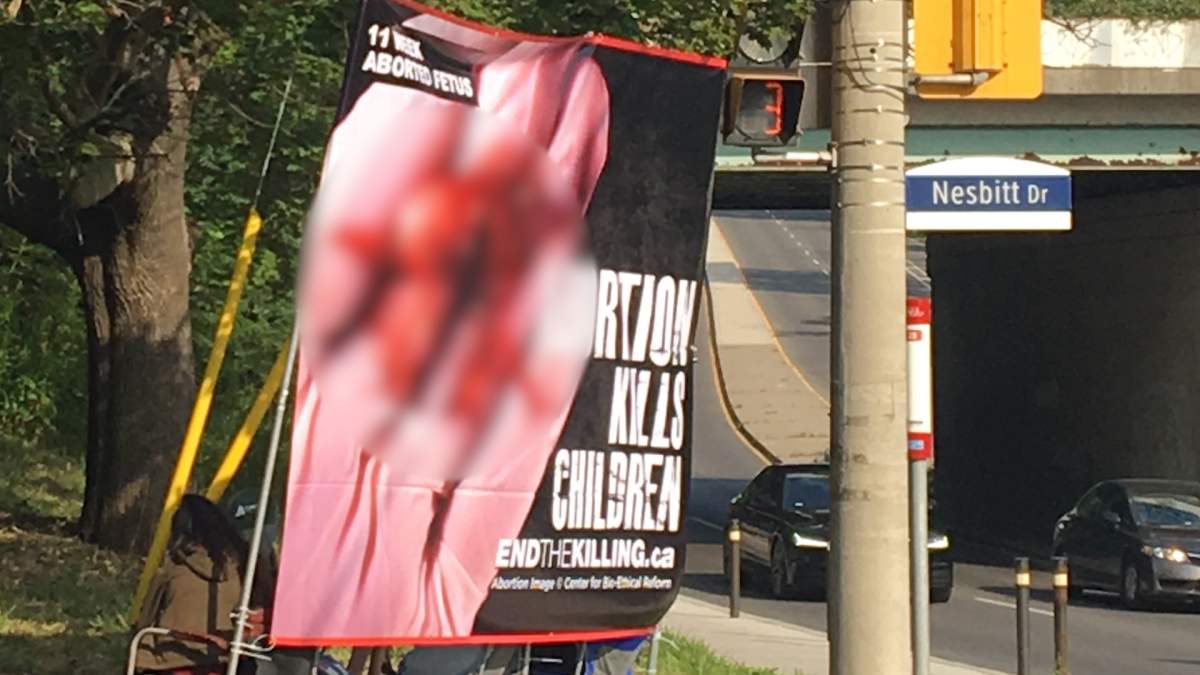Warning: Some images and content in this post may be disturbing to some readers.

If you live in Toronto, you may have noticed an increase in the number of graphic anti-abortion posters around the city.
They come courtesy of anti-abortion groups like the Canadian Centre for Bio-Ethical Reform (CCBR) and Show The Truth Canada and feature images of bloody, dismembered fetuses. The “protests” are known as “truth tours” and “choice chains.”
On Monday, Global News saw two such billboards from the CCBR at the corner of Bayview Avenue and Nesbitt Drive, steps away from a children’s playground and park.
“It’s natural for people to be angry or upset by seeing a picture of a child being killed, but I would say that we should be directing our anger not at the images, but the acts that cause the images to take place,” Isaac Longworth, a spokesperson for Show The Truth Canada, told Global News. “If a picture of abortion is so awful, and I agree that it is, doesn’t that mean that procedure is even more awful?”
READ MORE: Graphic anti-abortion flyers distributed in New Westminster spark outrage
The 24-year-old London, Ont. resident said his group often has neon signs warning the general public of their material, but sometimes they don’t.
“We try as much as possible to get our material into the eyes of our target audience which is teens and anyone who is able to have an abortion. In regards to children, we wish the children didn’t have to see it… however, we need to realize the lives of pre-born children supersede the rights of anyone, including born children, to not feel offended.”
But some Toronto residents and politicians want to see an end to graphic posters altogether. Last week, some urged the city to reassess bylaws that allowed groups to protest with these types of signs.

Get daily National news
Toronto city councillor Paula Fletcher of the Toronto-Danforth area sent a letter to the CCBR earlier this month, after residents complained their children were exposed to these images on the street or via graphic literature that was dropped in their mailboxes.
“The use of disturbing images have upset small children who often go out to collect the mail from mailboxes, women who have suffered a miscarriage, and pregnant women who plan to carry their pregnancy to term. Obviously, the parents of the children and the partners of the women in question are upset that their family members are traumatized in this way, or risk such trauma,” the letter stated.
Recently, an explicit confrontation between a Toronto vegan pizza shop owner and a protester went viral, catching the attention of Joyce Arthur, the executive director of Abortion Rights Coalition of Canada.
READ MORE: Advertising Standards Canada finds Lethbridge anti-abortion bus bench ad ‘inaccurate and misleading’
“[The posters] are very triggering and upsetting and the fact they even don’t care about children seeing them is troubling,” she told Global News. “Some groups like to go in front of schools and it’s particularly troubling because even in terms of freedom of expression, the Supreme Court has been very clear in past cases freedom of expression can be limited even more when you are targeting children.”
She adds another concern with having these posters near children is that it takes away from parents and educators being able to teach children about abortion themselves.
“It’s obviously damaging… some groups when children get upset they turn around and blame the parents,” she explained. “It seems to be almost a sign of desperation. These images have been shown in North America for decades now and they don’t change people’s minds.”
Dr. Jillian Roberts, a psychologist of FamilySparks based in Victoria, B.C., said although people have a right to their own opinions, many, including children, may find anti-abortion signs disturbing.
“Having this kind of signage near public parks makes it even more crucial for parents to talk to their children about all matters connected to sexuality. We simply cannot control the information flow around kids in this day and age — whether it be public signage or online materials,” she said.
And if your child does see these images, don’t be squeamish. “Avoiding these sensitive conversations puts your child at risk as they will seek out answers from other and often less reliable sources.”
READ MORE: Canadians split on summer jobs program funding controversy
She noted having “the talk” (sex or otherwise), isn’t something to be done in one sitting.
“I encourage parents to then extend this conversation over time, adding to the conversation in meaningful ways. By the time your child is a tween, they should have developed an in-depth understanding of the more complex topics, such as birth control, safe sexual practices and abortion.”
Arthur adds the only other thing concerned parents can do is to send their local councillor a letter stating they would like this kind of imagery banned and removed from their neighbourhoods.








Comments
Want to discuss? Please read our Commenting Policy first.